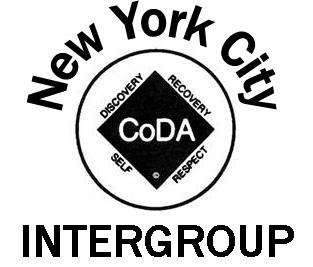 |
A Twelve Step self-help program for Co-Dependents |
| Click on a Step below to see the readings and exercises for that Step. Step 1 Step 2 Step 3 Step 4 Step 5 Step 6 Step 7 Step 8 Step 9 Step 10 Step 11 Step 12 |
CoDependents Anonymous (CoDA) in New York City This web site has been provided by NYC CoDA Intergroup Working the 12 Steps of CoDependents Anonymous (CoDA) © 2005 NYC CoDA Intergroup. All rights reserved. The CoDA 12 Steps and 12 Promises are © Co-Dependents Anonymous, Inc. The Twelve Steps and Twelve Traditions have been reprinted and adapted with permission of Alcoholics Anonymous World Services, Inc. Permission to reprint and adapt this material does not mean that AA has reviewed or approved the content of this publication, nor that AA agrees with the views expressed herein. AA is a program of recovery from alcoholism only – use of the Twelve Steps and Twelve Traditions in connection with programs and activities which are patterned after AA, but which address other problems, does not imply otherwise. Step 3 Co-Dependents Anonymous Step 3: “Made a decision to turn our will and our lives over to the care of God as we understood God.” Co-Dependents Anonymous Promise 3: “I know a new freedom.” Suggested Reading CoDA Blue Book pp. 35-39; The 3rd Step Prayer is on page 37. The Serenity Prayer is on page 11. 12 Step Handbook: Step 3 Chapter, pages 15-17. “CoDA 12 Steps & 12 Traditions Workbook – Steps 1,2,3” : Step 3 is pages 18-21. Exercises These exercises can help you work the 3rd Step. In other words, they allow you to get into the feelings and specifics and not just rush through the Step. Keep the task manageable; set safe boundaries for yourself. For example, you may say to yourself, “I will write for 15 minutes tonight.” Set a timer and let yourself stop when it goes off. Or you may say, “today I will practice letting go of ______.” Keep it simple. Consider “book-ending” with your exercises. Book-ending means telling someone, or your meeting, that you plan to do something, then telling them afterwards that you did it. It can help you show up for yourself. Finally, be gentle, and remember that sharing and reading about a Step is also part of working the Steps. 1. Without editing or over-analyzing, write about “what the 3rd Step means to me.” 2. How is my will related to controlling? Do I always get what I want when I control? How does it feel when controlling “works”? Does that feeling last? What extra things (side effects) do I get from controlling? How does it feel to let go? 3. What will happen if I can’t “figure it all out”? Can the mind stop the mind from obsessing? If I compulsively try to control myself and others, how can I stop doing it? Can I control myself into not controlling? Can a perfectionist cure perfectionism? What might be a 3rd Step approach to these issues? 4. Does turning my will over to God mean that I’m no longer allowed to want or ask for anything? What is the difference between wanting and needing something? Am I attached today to a particular outcome? What is hard about letting go, or “turning it over”? 5. Does this Step absolve me of responsibility? What is my role in my life? 6. Why does it say “to the care of God” and not just “to God”? What will my life be like if I turn it over to the care of God? What feelings come up? 7. What is my understanding of “God”? Can I trust God? Who can I trust? How does this affect my experience with the 3rd Step? 8. Look at the tools and questions on pages 20-21of the Steps 1,2,3 Workbook. Use any that feel right. 9. Exercise – when faced with stress, or with a difficult question – Pause. Say the Serenity Prayer. Breathe. 10. Exercise – try not giving an immediate answer to some question today. Ask if you can get back to the person later, perhaps at a certain time. Then say the 3rd Step prayer or the Serenity prayer. Let go. 11. Exercise – get a small box and designate it your “God box.” Write some problem you’re having on a piece of paper. Put the paper in the box. It’s now God’s. If you’re tempted to consider the problem, remember: you have given it to God to solve; it is no longer yours. Remove the problem when God has solved it for you. 12. Exercise – pick one person or situation in your daily life that causes you stress. Just for today, turn it over to God. Imagine the person or situation in your hands. Then, open your palms and imagine the person or problem floating away to God. Let go of your will for that person or situation today. There is nothing you have to say or do or “prove” today. Just let go. And let God. If you want to be on our email list to receive updates on upcoming CoDA events in New York City, please write to anicko2794@yahoo.com For more CoDA info, go to www.codependentsnyc.org or call 646-289-9954 For more information on the program of CoDependents Anonymous, visit the CoDA World Fellowship web site at www.coda.org |